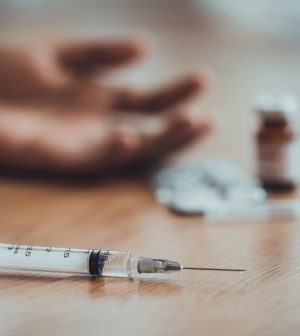- Could Artificial Sweeteners Be Aging the Brain Faster?
- Techniques for Soothing Your Nervous System
- Does the Water in Your House Smell Funny? Here’s Why
- Can a Daily Dose of Apple Cider Vinegar Actually Aid Weight Loss?
- 6 Health Beverages That Can Actually Spike Your Blood Sugar
- Treatment Options for Social Anxiety Disorder
- Understanding the Connection Between Anxiety and Depression
- How Daily Prunes Can Influence Cholesterol and Inflammation
- When to Take B12 for Better Absorption and Energy
- Epsom Salts: Health Benefits and Uses
Sackler Family & Purdue Pharma Reach Deal With U.S. States Over Opioid Crisis

A deal has been reached between members of the Sackler family and their company, Purdue Pharma, to settle thousands of lawsuits over their role in the U.S. opioid epidemic.
In return for an end to all current and future civil claims against them over the company’s prescription opioid business, the Sacklers will pay as much as $6 billion to assist communities harmed by the opioid crisis, according to a court filing on Thursday, the New York Times reported.
However, that liability protection does not extend to criminal prosecutions linked to the marketing of Purdue’s prescription opioid painkiller OxyContin.
The settlement has to be approved by Judge Robert Drain, who has presided over the company’s bankruptcy proceedings, and the U.S. Court of Appeals for the Second Circuit would have to approve, reversing a December ruling that rejected an earlier settlement deal for $4.55 billion. A federal judge had vacated that plan, questioning the legality of the protections from liability granted to the Sacklers, the Times reported.
Also, the immunity shield for the Sacklers from civil suits is being challenged by the U.S. Trustee program, which serves as a watchdog over the bankruptcy system.
“This settlement is both significant and insufficient — constrained by the inadequacies of our federal bankruptcy code,” said Connecticut Attorney General William Tong, who helped lead the effort to get the new deal, the Times reported.
“But Connecticut cannot stall this process indefinitely as victims and our sister states await a resolution. This settlement resolves our claims against Purdue and the Sacklers, but we are not done fighting for justice against the addiction industry and against our broken bankruptcy code,” Tong added.
Purdue pleaded guilty to criminal charges of misleading marketing and minimizing OxyContin’s risk of addiction, but no individual Sackler has ever apologized or admitted wrongdoing, the Times reported.
“While the families have acted lawfully in all respects, they sincerely regret that OxyContin, a prescription medicine that continues to help people suffering from chronic pain, unexpectedly became part of an opioid crisis that has brought grief and loss to far too many families and communities,” read a statement from two branches of the Sacklers, the Times reported.
Negotiations over the new settlement were mediated by Judge Shelley Chapman of U.S. federal bankruptcy court, who is recommending a hearing where people who suffered from addiction to OxyContin could describe the harm they suffered. At least one Sackler family member from each of two branches would have to attend.
Chapman also said if any medical centers and art or educational institutions bearing the Sackler name ask to have it removed, the Sacklers must agree.
“This bankruptcy needs to end. And the Justice Department needs to flex their muscle and investigate the Sacklers criminally, which is permissible under the bankruptcy plan,” Ryan Hampton, who monitored the settlement proceedings on behalf of victims, told the Times.
More information
For more on the U.S. opioid epidemic, see the U.S. Department of Health and Human Services.
SOURCE: New York Times
Source: HealthDay
Copyright © 2026 HealthDay. All rights reserved.










